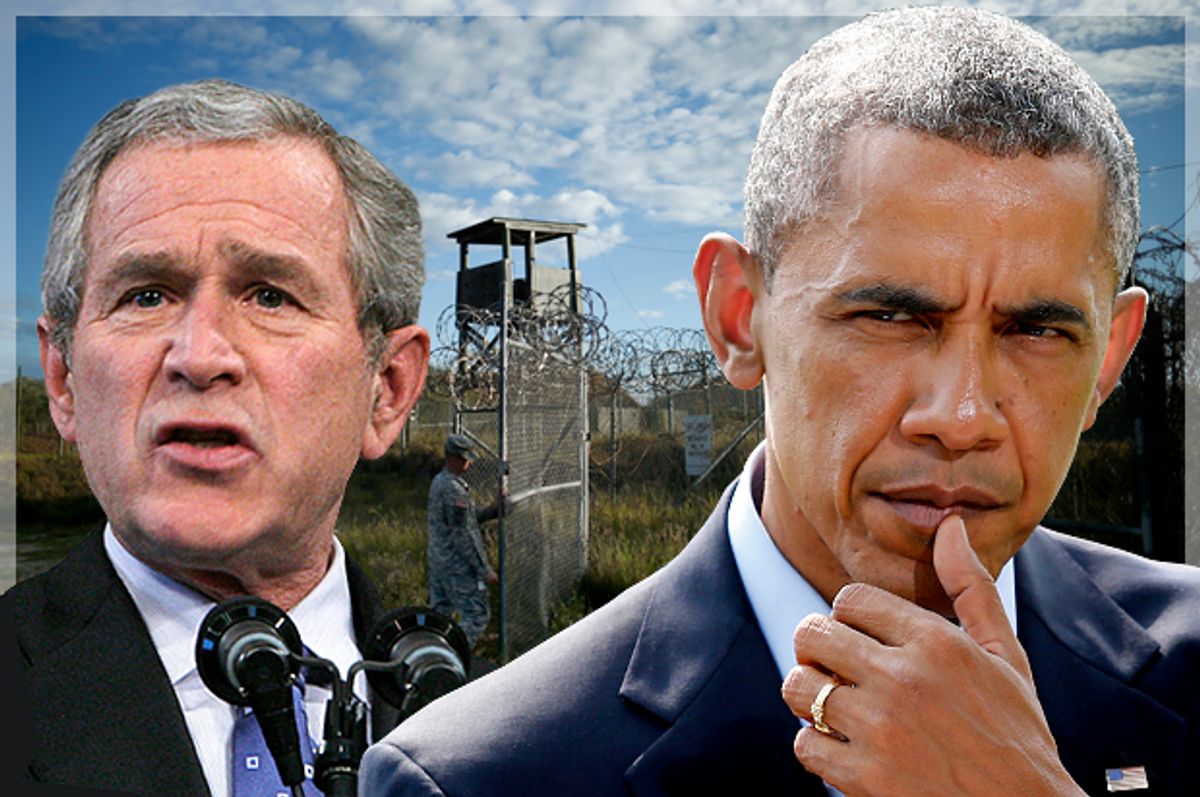The prison at Guantanamo Bay is a blight upon America. It’s a useless, expensive, and indefensible mockery of American ideals that should never have been opened. It harms American interests by doing nothing more than existing. It undermines any aspiration we may have to be an international beacon of human rights and justice. It weakens our credibility when we criticize regimes that make it a regular practice of locking people up, without charge, until they are dead. Gitmo should be closed as soon as is feasible.
To that end, the White House is, according to the Wall Street Journal, “drafting options that would allow President Barack Obama to close the detention facility in Guantanamo Bay, Cuba, by overriding a congressional ban on bringing detainees to the U.S.” Obama’s been promising a lot of executive action of late, and this would certainly be among the more ambitious assertions of his authority. But we’ve been down this road before. Many, many times.
Obama campaigned on closing Gitmo and signed an executive order his first day in office pledging to have it shut down within a year. That, obviously, didn’t happen. A lot of the blame belongs to Congress and its members – both Republican and Democratic – who blend a paralyzing fear of terrorists with an outspoken (and completely unjustified) lack of faith in the civilian criminal justice system to handle terrorism cases. In the 2010 lame-duck session, Congress attached language to the National Defense Authorization Act forbidding the White House from transferring Guantanamo inmates to U.S. soil. Because the bill funded continued military operations in Iraq and Afghanistan, Obama signed it. But he attached a signing statement expressing his “strong objection to these provisions” (more on signing statements in a moment).
Since then, the push to close Gitmo has withered. Obama’s brought it up a few times here and there, throwing a line or two into speeches about how our principles and governing ideals demand that the prison be closed down, but Gitmo persists. Not only is it still there, it’s digging in. The Huffington Post’s Ryan Reilly reported last year that even though the number of inmates at Gitmo has dwindled to less than 200, Congressional resistance to ever doing anything means that the ones who remain will be there indefinitely. “Effectively banned from the continental U.S. by Congress, disowned by their home countries and unwelcome pretty much everywhere else, they have no place to go.”
In the meantime, more money is spent housing the detainees ($2.7 million per detainee, per year) and refurbishing the facility, while little to no progress is made in the legal cases against the detainees. For all the faith Republicans and neoconservatives put in the military tribunal system for trying terrorism cases, they’re actually quite terrible at producing convictions. The masterminds of the 9-11 terrorist attacks held at Gitmo – including Khalid Sheik Mohammed – are still awaiting trial.
But that’s the way Congress wants it to shake out. Reacting to the news of President Obama’s plans to end-run Congress on Gitmo, Speaker John Boehner offered a response that was characteristic of your average pro-Gitmo lawmaker: “Even as Islamic jihadists are beheading Americans, the White House is so eager to bring these terrorists from Guantanamo Bay to the United States that it is examining ways to thwart Congress and unilaterally re-write the law.” The recent acts of barbarism of the Islamic State have nothing to do with the inmates at Guantanamo, but somehow they provide justification for maintaining the detention facility. There’s nothing rational about it.
As for Obama’s new plans to close the facility through executive action, he’s actually painted himself into a corner on this one. In the past, the Obama administration has justified the use of executive authority by claiming that Congress was refusing to act on issues of national importance, and thus it fell to the president to get stuff done in the national interest. Obama’s (many times delayed) action on immigration is perhaps the best example of this.
With Guantanamo, it’s different. On this issue, Congress did act – it specifically forbade the use of funds to transfer Gitmo prisoners to the United States. So Obama has two options: veto the new National Defense Authorization Act and trust that it won’t be overridden by Congress, or sign it and issue a signing statement saying that he won’t be bound by the language handcuffing the White House on Gitmo.
If I had to guess, I’d say that a veto of the NDAA is a very unlikely possibility. The White House just committed the country to a new series of military actions in Iraq and Syria, and vetoing the legislation would open up the White House to (likely bipartisan) accusations that they’re cutting off funding for military forces in combat. That’s a political headache that I’m sure they’d much rather do without.
That leaves a signing statement, and that’s also a big problem, given that Obama got himself elected in many ways as the antithesis of George W. Bush. He promised to get rid of Gitmo, and he promised not to use signing statements in the way the Bush administration did to ignore hundreds of laws passed by Congress. “I believe in the Constitution and I will obey the Constitution of the United States,” Obama said in 2008. “We're not going to use signing statements as a way of doing an end-run around Congress.”
Thus we’re left with a bitterly ironic situation in which Obama, in trying to expunge this disgusting remnant of the Bush administration, is considering a very Bush-like move to get it done.



Shares